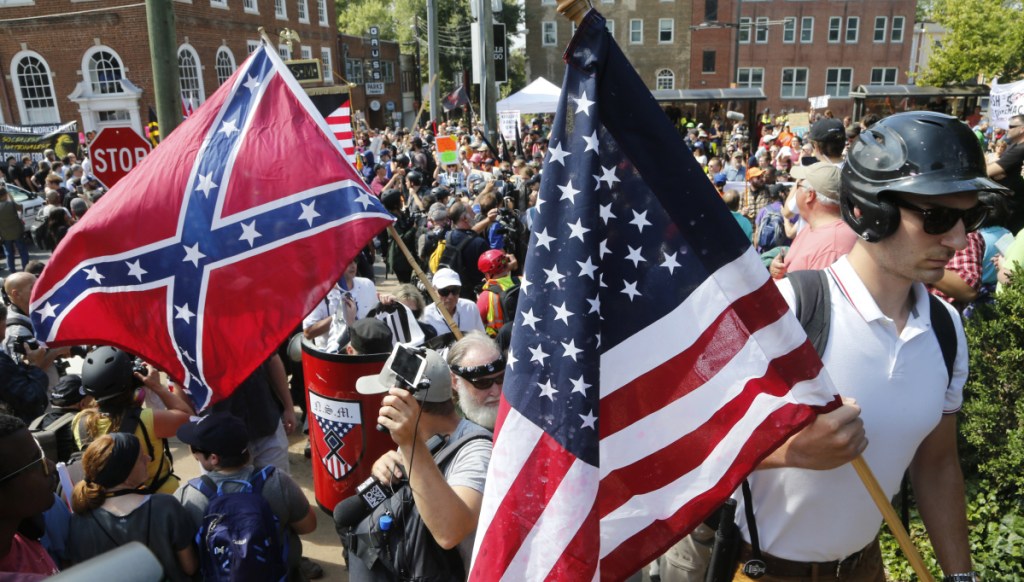Hate groups continued to expand their reach in the United States last year during a tumultuous 12 months marked by racist violence, social media attacks and the deadly white supremacist rally in Charlottesville, Virginia, according to a nonprofit legal advocacy organization that monitors extremist activity.
The Southern Poverty Law Center identified 954 groups as hate groups, which it defines as “an organization that – based on its official statements or principles, the statements of its leaders, or its activities – has beliefs or practices that attack or malign an entire class of people, typically for their immutable characteristics.” That number was up from 917 in 2016 and 892 in 2015, according to a study the center released Wednesday.
Much of the rise took place inside the white supremacist movement. The number of neo-Nazi groups grew from 99 to 121, anti-Muslim groups grew from 101 to 114 and anti-immigrant groups grew from 14 to 22. The law center asserted that the growth among white supremacists was fueled in large part by racially divisive language and actions by President Trump.
RADICAL RIGHT EMBOLDENMENT
“This has been a year that has seen increasing divisiveness and bigotry, particularly in the mainstream of American life,” Heidi Beirich, director of the Southern Poverty Law Center Intelligence Project, said in a conference call with reporters Wednesday. “There has been a substantial emboldenment of the radical right and that is largely due to the actions of President Trump, who has tweeted out hate materials and made light of the threat to our society posed by hate groups.”
Trump came under sharp criticism following the violence in Charlottesville when he said there was “blame on both sides” and seemed to equate the white supremacists with those who opposed them.
The White House rejected the law center’s assertion that Trump was responsible for the growth of white supremacist groups.
“The president condemns hatred, bigotry and violence in all forms,” deputy press secretary Raj Shah wrote in an email. “He will continue to fight for all Americans, regardless of race, religion, gender or background, and any suggestion otherwise is wrong and insulting.”
But according to Beirich, the participants in the Unite the Right rally are people who view Trump positively and the president “has brought them into the political system in a way that hasn’t happened in decades.”
The report designates as hate groups anti-LGBT organizations, anti-government militias and black nationalist groups, including the Nation of Islam, which profess anti-Semitic, anti-white and anti-LGBT rhetoric. It points out that those groups should not be confused with “mainstream black activist groups such as Black Lives Matter that work to eliminate systemic racism in American society and its institutions.”
TWO MENS GROUPS ADDED
For the first time, the Southern Poverty Law Center added to its hate list two men’s rights groups – Return of Kings and A Voice for Men.
“They demonize women as an entire population,” Beirich said. “It’s the same kind of language directed at demonizing all women and trying try to make women look like a lesser form of humanity.”
Many of the groups the center identified as hate groups reject that label. “The listing is a complete farce,” said Paul Elam, CEO of A Voice for Men.
Roosh Valizadeh, who operates the Return of Kings website, called the report “a mountain of lies” and said it was “merely an attempt to shut down speech that goes against their far left agenda.”
Return of Kings “is a website operated solely by myself without any employees,” Valizadeh wrote in an email. “How can one man’s blog be a ‘hate group?’ ”
The Nation of Islam did not immediately respond to a request for comment.
Perhaps surprisingly, the number of Ku Klux Klan groups dropped dramatically from 130 to 72, an indication, the law center says, that the 150-year-old organization has little appeal for a new generation of white supremacists.
Though the overall number of hate groups continues to rise, Beirich said the violence in Charlottesville and the negative publicity that followed had an immediate impact that may reduce their effectiveness.
Send questions/comments to the editors.



Success. Please wait for the page to reload. If the page does not reload within 5 seconds, please refresh the page.
Enter your email and password to access comments.
Hi, to comment on stories you must . This profile is in addition to your subscription and website login.
Already have a commenting profile? .
Invalid username/password.
Please check your email to confirm and complete your registration.
Only subscribers are eligible to post comments. Please subscribe or login first for digital access. Here’s why.
Use the form below to reset your password. When you've submitted your account email, we will send an email with a reset code.